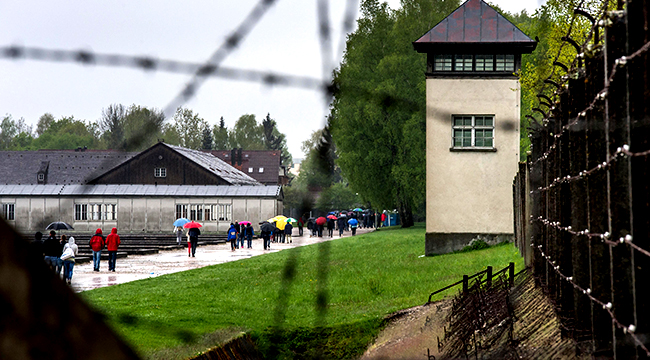
Germany, like much of the free world, is fighting the aggression of the far-right’s resurgence right now. Hate crimes and anti-Semitism are on the rise from America to Poland. This was amplified when, for the first time since World War II, a blatantly fascist far-right political group won seats in Germany’s parliament: The Alternative For Germany Party or AfD. This is, in part, due to the one-million migrants that arrived in the country nearly three years ago but also due to a lack of education in poorer parts of former East Germany.
Part of the issue with the influx of migrants from predominantly Muslim nations — some of which teach their citizens that the Holocaust is a lie — is that the possibility for anti-Semitism on the streets of Germany grew. It’s imperative to note that nine out of ten anti-Semitic hate crimes that happen in Germany is carried out by white Germans. And this is why there’s a politician who wants to make trips to Nazi death camps mandatory for everyone.
See, Germany doesn’t mess around with anti-Semitism, or Nazi-apologists, or straight up Holocaust denial. There are laws in place that prohibit all of those actions, speeches, and movements — some of them carrying serious jail time and very steep fines. Moreover, trips to Nazi death camps aren’t out of the ordinary. It’s already mandatory for all Bavarian students to visit Nazi death camps as part of their Holocaust curriculum. Now, with the rise of the AfD, Germans are starting to think that it’s time to expand that mandate.
Sawsan Chebli, a Berlin-born politician (herself of refugee descent), made the recommendation from her Secretary of State post at the Berlin Mayor’s Office. “I think it would make sense if everyone living in this country would be obliged to visit a concentration camp memorial site at least once in their lifetime,” Chelbi told the Bild am Sonntag recently.
The World Jewish Congress agreed and endorsed the idea of making death camp visits mandatory. Ronald S. Lauder, head of the World Jewish Congress agreed, stating, “this proposal is an encouraging and effective method of educating people of all backgrounds about the Nazi attempt to wipe out the entire Jewish population of Europe and the dangers such hatred can yield.”
It’s very well documented through decades of empirical research that anti-Semitism, racism, and the rise of authoritarian fascism is rooted in under-educating, anti-intellectualism, and a straight-up lack of education. The proposal from Chebli and the World Jewish Congress aims to fight that head-on with actual, hands-on education. They believe that it’s education that we need to fight the latest rise of the far-right.
Teachers in Berlin and the surrounding area reported to The New York Times that children and teenagers’ views were completely changed after visiting and working at Nazi death camps on art projects and reconstructions. What’s more, by taking all students to the camps, they learn that it wasn’t only the Jews being murdered, but Muslims, homosexuals, Roma, musicians, foreigners, the homeless, jobless, the disabled, and everyone else the Nazis considered an enemy of the state. The guide at the Saschenhausen camp near Berlin, Germany’s capital, puts it this way, “our most powerful tool,” she said in The New York Times, “is identification.”
https://www.instagram.com/p/BeeUcnZHub4/
According to The New York Times, teachers in Berlin are seeing a pushback already. Some white Germans are simply calling in sick the day of trips to Sachsenhausen so that their kids (who reportedly are already showing Neo-Nazi tendencies) don’t have to experience the camp. That’s why Chebli and the World Jewish Congress feel making this a mandatory trip is a next step in educating children who are at risk of falling into the uneducated authoritarian trap of the far-right.
“This is about who we are as a country,” Chelbi declared recently in Berlin, “we need to make our history relevant for everyone: Germans who no longer feel a connection to the past and immigrants who feel excluded from the present.”
A trip down the darkness of the Holocaust feels like a bridge to assure that we never forget those horrors and, hopefully, we stop ourselves from repeating them.






